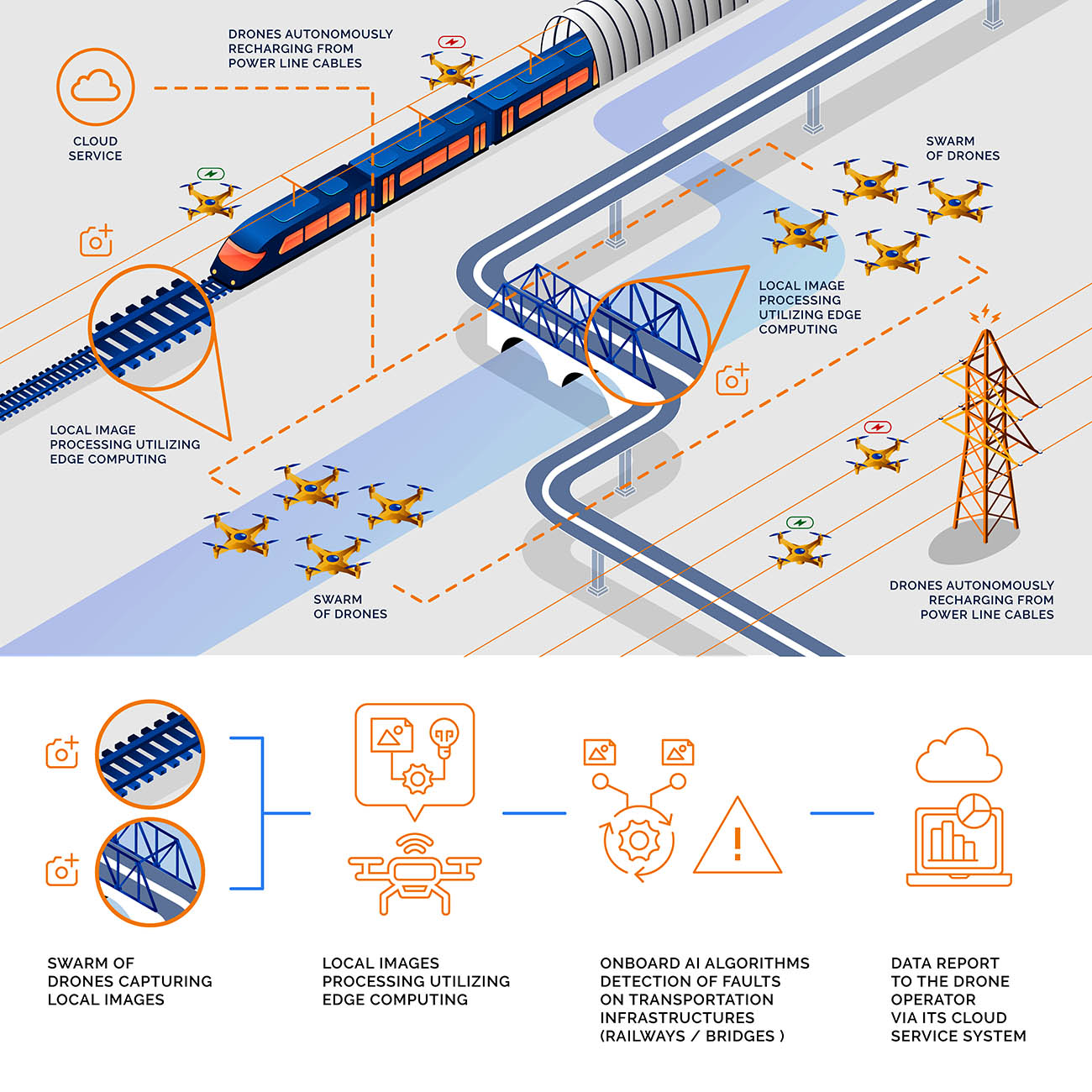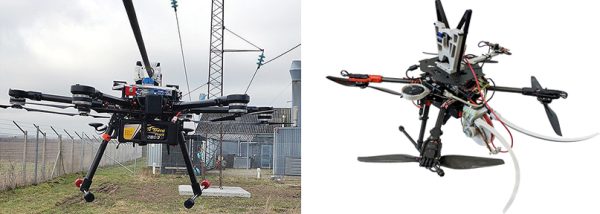Building a cooperative, autonomous, operating drone system to enhance transport safety
The Drones4Safety (D4S) project was a Horizon 2020 (H2020) project that aims to increase the safety of the European civil transport system by developing a system of autonomous, self-charging, and cooperative drones to inspect a big portion of transportation infrastructure in a continuous operation. The project solutions utilize the existing energized infrastructure, like overhead power or rail lines, to charge its drones to operate for a longer time. The project gets information about the transport infrastructure to be inspected from open maps and satellite data and forwards that information to its drones to conduct their autonomous and collaborative inspection missions.
The conceptual view of the project shows a set of drones that have a self-charging capability to harvest energy from overhead power line cables (transmission lines/railway catenary lines). The drones are working autonomously in a swarm and apply sensor fusion and onboard signal processing techniques to fly, inspect, and recharge autonomously. Advanced AI algorithms have been developed and trained to detect anomalies in the gathered transportation infrastructure (railways/bridges) data. A cloud service system has been also developed to offer inspection services such as mission control and swarm fleet management.

The D4S project’s main objectives was:
- developing a solution for harvesting energy for continuous drone inspection;
- increasing inspection efficiency by AI development;
- providing a platform for a cooperative drone operation for inspections;
- building a cloud-based system for autonomous navigation.
These has enabled drones to inspect linear railway and bridge infrastructure across the EU member states while benefiting from the recommendations by the European Union Aviation Safety Agency (EASA) for having common European rules on drones to ensure safe, secure, and sustainable operations.

The consortium consisted of 9 organizations from 5 different EU member states, with SDU (Denmark) as coordinator. In the project, the Eucentre Foundation contributed its experience expertise in bridge damage inspection and structural assessment, in the relevant Work Packages. In WP4, the role of Eucentre was to supply the dataset for identifying structural elements and damage to be used for the training and validation of AI algorithm, and to implement a bridge simplified structural assessment methodology accounting for the presence of damage. The support for drafting protocols and planning for bridge inspection to be implemented in the system was an additional role carried out within the project. Finally, Eucentre was the leader WP7 (system integration and case study), within which it was responsible for the bridge use case.

 Eucentre is a non-profit private law foundation whose mission is to conduct research and provide training and services in earthquake and safety engineering
Eucentre is a non-profit private law foundation whose mission is to conduct research and provide training and services in earthquake and safety engineering  Eucentre promotes science, research and innovation for the benefit of the community, offering targeted methodologies and concrete solutions for prevention, safety and resilience. It collaborates with institutions and companies to disseminate competencies for the common good.
Eucentre promotes science, research and innovation for the benefit of the community, offering targeted methodologies and concrete solutions for prevention, safety and resilience. It collaborates with institutions and companies to disseminate competencies for the common good. Eucentre conducts earthquake engineering research and risk reduction studies via laboratory testing and numerical analysis to enhance seismic performance and develop innovative solutions
Eucentre conducts earthquake engineering research and risk reduction studies via laboratory testing and numerical analysis to enhance seismic performance and develop innovative solutions  Eucentre carries out research activities in earthquake engineering and risk reduction through laboratory testing and numerical analysis, aiming to improve the seismic performance of structures and soils and to develop innovative seismic retrofitting techniques.
Eucentre carries out research activities in earthquake engineering and risk reduction through laboratory testing and numerical analysis, aiming to improve the seismic performance of structures and soils and to develop innovative seismic retrofitting techniques. The Foundation promotes diverse and high-quality training activities aimed at academic and professional contexts, with constantly updated and innovative programs and initiatives designed to meet the evolving needs of the sector and society
The Foundation promotes diverse and high-quality training activities aimed at academic and professional contexts, with constantly updated and innovative programs and initiatives designed to meet the evolving needs of the sector and society  Eucentre ensures communication aimed at informing institutions, professionals, and citizens about ongoing activities and projects, with the goal of disseminating useful and accessible content and knowledge. It contributes to promoting a shared and informed culture of prevention and resilience.
Eucentre ensures communication aimed at informing institutions, professionals, and citizens about ongoing activities and projects, with the goal of disseminating useful and accessible content and knowledge. It contributes to promoting a shared and informed culture of prevention and resilience.
